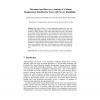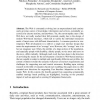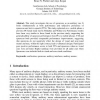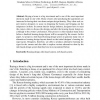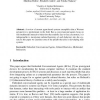99
Voted
HCI
2009
15 years 12 days ago
2009
The Camera Mouse is a mouse-replacement interface for users with movement impairments. It tracks a selected body feature, such as the nose, eyebrow or finger, through a web camera ...
127
click to vote
HCI
2009
15 years 12 days ago
2009
The design and implementation of systems that combine both the utilities of the digital world as well as intrinsic affordances of traditional artifacts are challenging. In this pap...
134
click to vote
HCI
2009
15 years 12 days ago
2009
Abstract. The Web is constantly evolving into an unprecedented and continuously growing source of knowledge, information and services, potentially accessed at by anyone anytime, an...
HCI
2009
15 years 12 days ago
2009
This study investigates the use of spearcons as an auditory cue. It looks simultaneously at both performance and subjective preference of spearcons and text-to-speech (TTS). The st...
HCI
2009
15 years 12 days ago
2009
Buying a home is a big investment and is one of the most important decisions made in one's life. Home owners after purchasing the apartments are interested in having their own...
96
Voted
HCI
2009
15 years 12 days ago
2009
A review of current agent-based systems exemplifies that a Western perspective is predominant in the field. But as conversational agents focus on rich multimodal interactive behavi...
116
Voted
HCI
2009
15 years 12 days ago
2009
For enhancing current driver assistance and information systems with regard to the capability to recognize an individual driver's needs, we conceive a system based on fuzzy lo...
143
click to vote
HCI
2009
15 years 12 days ago
2009
This paper describes two affect-sensitive variants of an existing intelligent tutoring system called AutoTutor. The new versions of AutoTutor detect learners' boredom, confusi...
61
Voted
HCI
2009
15 years 12 days ago
2009
118
click to vote
HCI
2009
15 years 12 days ago
2009
This paper presents a new kind of interaction between users and a tabletop. The table described is interactive and associated with tangible and traceable objects using RFID technol...
